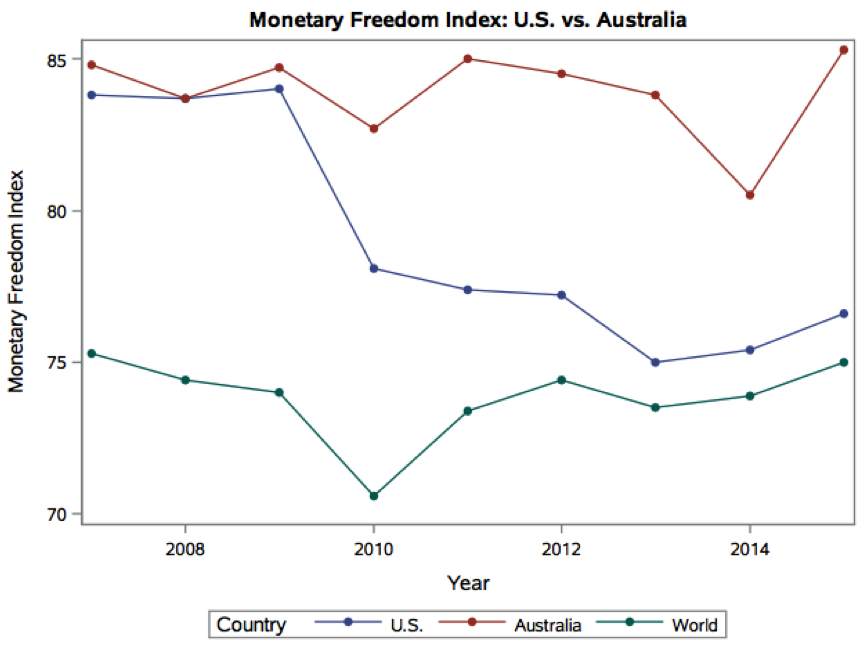Sound Money Project
The Sound Money Project was founded in January 2009 to conduct research and promote awareness about monetary stability and financial privacy. The project is comprised of leading academics and practitioners in money, banking, and macroeconomics.
It offers regular commentary and in-depth analysis on monetary policy, alternative monetary systems, financial markets regulation, cryptocurrencies, and the history of monetary and macroeconomic thought.
For the latest on sound money issues, subscribe to our working paper series and follow along on Twitter or Facebook.
Advisory Board: Steve H. Hanke, Jerry L. Jordan, Lawrence H. White
Director: William J. Luther
Senior Fellows: Nicolás Cachanosky, Gerald P. Dwyer, Joshua R. Hendrickson, Thomas L. Hogan, Gerald P. O’Driscoll, Jr., Alexander W. Salter
Fellows: J.P. Koning
|
Monetary freedom: Australia vs. the United States
The following is a contribution by a visiting scholar from the Mannkal Foundation in Australia According to the 2015 Heritage Foundation index of economic freedom, the United States is ranked 88th out […]
|
Interest rates, profits and competition
Over at the Wall Street Journal, Greg Ip sees a lack of competition in corporate America.
|
NGDP targeting: An overview
The prolonged recovery that followed the Great Recession has brought about increased support for a monetary policy rule known as Nominal Gross Domestic Product (NGDP) targeting. This form of targeting […]
|
Op-ed: The Greek referendum: Will economic principles prevail?
Ultimately, an economy can only sustain itself if it produces more than it consumes. That’s a lesson that the Soviet Union learned the hard way decades ago, explains Atlas Network […]
|
Op-ed: Was the euro mistake?
Originally posted on the Atlas Network page With Greece rejecting the structural reforms and other terms that it would need to implement for yet another bailout of its crushing government debt, economists […]
|
On interest rate targeting
Previously I discussed inflation targeting as a popular rule for governing central bank behavior. In this post I will discuss interest rate targeting, another popular recommendation that has its own […]
|
Understanding the Greek crisis
As I write these lines, it is almost certain that Greece will default on its debt today, June 30. What led to such a disastrous situation? To understand, we must […]
|
Why free-banking?
The need for and convenience of a central bank are usually taken for granted. To say that a central bank is a good institution and, therefore, needed, is not enough. […]
|
Inflation targeting as a monetary policy rule
Among economists who agree that monetary policy should be conducted according to predictable rules, perhaps no proposed rule enjoys greater support than inflation targeting. In brief, inflation targeting means the […]
|
Sound money alternatives series
Over the next few weeks, the Sound Money Project will be running a series of blog posts exploring free-market monetary alternatives. Our dedicated fellows will prepare a series of posts […]
|
Why are real interest rates so low?
In a recent blog post, Alex Salter discusses the problem of reasoning from a price change in the context of interest rates. Simply put, observing a low interest rate does […]
|
More on money and interest rates
A confusion arising from the popular usage of the word “money” is that bankers claim to lend money and bank customers claim to borrow money. But, people do not increase […]










